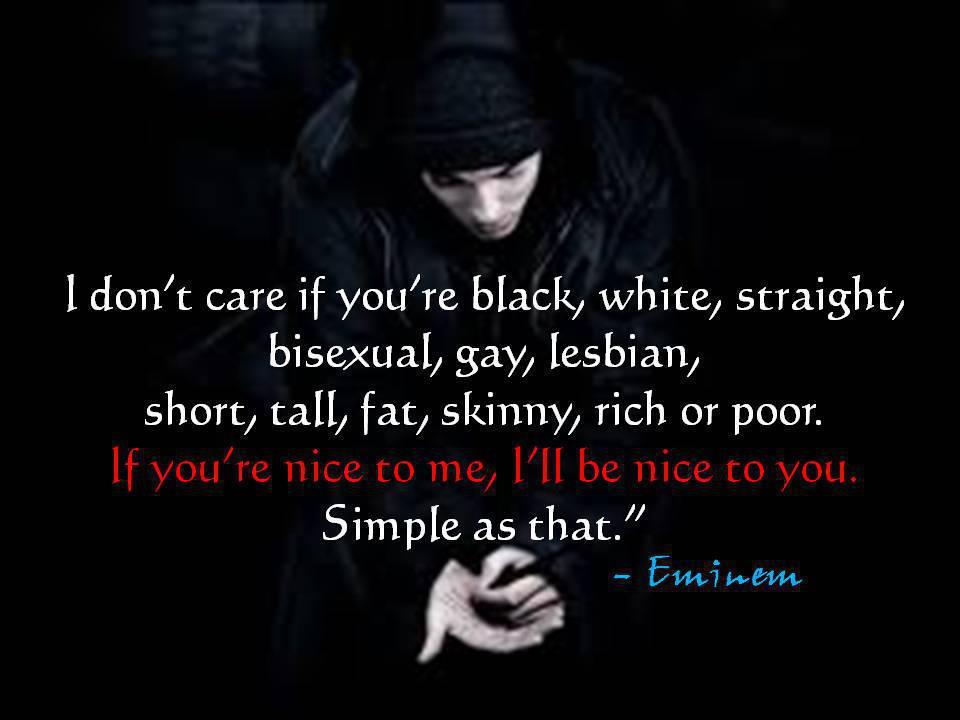The following article was originally published on the Roads from Emmaus weblog in February of 2012.
I spotted this image on Facebook today, and it puts forth a commonly accepted ethic, which I’ve dubbed here the Eminem Ethic. Essentially, various categories of race, sexual desire, physical appearance, and economic status don’t matter when it comes to winning his kindness. What matters is that “you’re nice to me.”
This sounds pretty good. This is a morality bandwagon that probably most folks in American culture could jump on. It probably even sounds noble. And of course this is a familiar ethic. In 1991, Michael Jackson told us that it didn’t matter if we were black or white. He would probably add Eminem’s various categories, too, if he were writing his song now.
Probably the most obvious point here is that these various categories of human being and behavior don’t matter much when it comes to kindness toward others. With that, I agree. I laud Eminem’s desire to be kind to people without regard to these categories.
But let’s think about this for a moment. It is probably one of mankind’s most basic yearnings that we overcome divisions between each other. Even the most rabid Nazi, despite his desire to expel all difference from Germany, actually desired peace and not divisiveness—his method for attaining it was of course, monstrous. The Eminem Ethic is similarly problematic, because it also expels difference from his sense of community, but in this case, it is a difference based on one behavior—being nice.
Implicit in this ethic is its inverse: If you are not nice to me, I will not be nice to you. This is the ethic of revenge. There is nothing in the Eminem Ethic that will prevent or end wars, that will overcome differences, that will bring about peace, because he leaves us the excuse for not being nice to those who are not nice to us.
And we are also left with this ethical problem: If being nice depends on the nice behavior of others, then who actually gets the ball rolling? Someone will first have to be nice to someone who has not yet been nice to them. But if everyone follows the Eminem Ethic, then there will never be any niceness at all, because we’d all be waiting for other people to be nice first before we return the favor.
Let’s compare this ethic with the ethic that is, quite frankly, superior to all others:
But if you love those who love you, what credit is that to you? For even sinners love those who love them. And if you do good to those who do good to you, what credit is that to you? For even sinners do the same. And if you lend to those from whom you hope to receive back, what credit is that to you? For even sinners lend to sinners to receive as much back. But love your enemies, do good, and lend, hoping for nothing in return; and your reward will be great, and you will be sons of the Most High. For He is kind to the unthankful and evil. Therefore be merciful, just as your Father also is merciful. (Luke 6:32-26)
When at the birth of Jesus the angels announced to the shepherds that there would be “peace on Earth,” this is what they surely had in mind. Jesus was born into a world dominated by the pagan ethic of obligation and revenge—which is what the Eminem Ethic actually is. But He came to bring something higher, something far better, and that is the ethic of love.
True love is not obligation or reciprocity. It is not what you owe someone else, and it is not in return for something you have received. In sending His Son Jesus, the Father gets the ball rolling, but it is not the ball of niceness, but of love. And what is love? It is to care for and give to another in a self-sacrificial way. Jesus puts it exceptionally clearly in the quote above, and He even tells us to love not just those who have failed to be nice to us, but even those who hate us and oppose us, the unthankful and the evil.
In the passage immediately preceding the one quoted above, Jesus says this:
But I say to you who hear: Love your enemies, do good to those who hate you, bless those who curse you, and pray for those who spitefully use you. To him who strikes you on the one cheek, offer the other also. And from him who takes away your cloak, do not withhold your tunic either. Give to everyone who asks of you. And from him who takes away your goods do not ask them back. And just as you want men to do to you, you also do to them likewise. (Luke 6:27-31)
In our time, the Golden Rule (essentially taken from Luke 6:31, the last sentence in this quote) has become distorted into the paganized Eminem Ethic: “Do unto others as others do unto you.” But the Christian, like his Master, is called to be something far greater, and it is because he is a citizen of the Kingdom of Love, because God is Love, and because He first loved us, even while we were His enemies.
We will never overcome judgmentalism, prejudice, hatred, violence and war if we merely care for those who do the same for us. But a new Kingdom has been inaugurated, and its triumph is coming. There is only one way to become a citizen of that Kingdom.
Will you be one of them?




One comment:
Comments are closed.